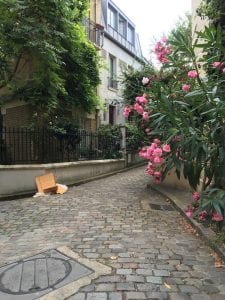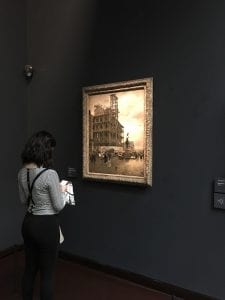In the 28 days that I’ve inhabited France and French culture, like Ariana and Rishika before me, I’ve been hyper vigilant of my surroundings out of desire to soak up everything possible. And at first I very much conflated my feeling of fullness, of awe and delight, of temporal occupation, with the experience of habituating to a new environment. It was “La Vie en rose.”
And there are realities to Paris (glossed over in my last entry, and fortunately investigated more thoroughly in our course on French culture) that connect this metropolitan hub to dozens of other world class cities¹, but at this moment I wish to capture my enchantment before it dwindles. Thus, I present a series of themes connected to emotions and experiences and propose an idealized Unified Theory.
***
To begin², I read David Chang’s “Unified Theory of Deliciousness” not long before departing, and, in it, he discusses strange loops, a concept, articulated by Howard DeLong and Douglas Hofstadter, to denote “occasions when mathematical systems or works of art or pieces of music fold back upon themselves.” Chang considered the applicability of loops in taste and developed his theory of deliciousness to say that the tastes we immediately adore are ones that beckon us to an elemental love, a Ratatouille. I love this article in relation to food³ but also in relation to this city because I’m nerdy about math and logic, and because I’m so in love with Paris that it helps to rationalize my sense of completion and fullness. Nowhere else have I paused as often on a sidewalk to marvel at nothing—to fix on the plein air—and feel as whole.
So to echo Chang, I conceive of the escargot city as a perfectly contained microcosm: a closed system, full of loops and answers to calls. The (imprecise) evidence I have of this containment and its limits is the sense that talking about the city to my friends back home who’ve not been here feels impossible. This is actually crazy and surely a self-imposed, imagined constraint, but to people beyond the escargot, I don’t think I can convince to believe in any of this.
***
Serendipity was first. After I alerted Facebook about my temporary migration, a friend from high school messaged me to say she was staying the whole year on exchange at Sciences Po. I let the message marinate for a few days since I’d just gotten in and hadn’t begun to recover my bearings—but I felt bad because I’d clicked on it, and she would see the dreaded read receipt. It was a few days after arriving that we had an orientation to Sciences Po, and crossing Boulevard Saint-Germain for the second time ever, I spotted her—I had the chance to explain in person how I was meaning to reply, how I’d love to meet up.
Then another time, taking the train, I’d gotten separated from a group as I casually let others shuffle in past me and the closing-alarm sounded. I had no sense of where to go after I hopped onto the next train, but my confusion parsed that it was in my interest to get off at right then and refer to the pocket metro map IPD equipped us with on day one. I stood at the landing of the exit stairs, turning the map around, helpless because I didn’t even know which stop marked school. So I proceeded back down the steps, and just around the corner were familiar faces.
These are just two instances from a mounting collection of fortune. Yes, Paris is small and expensive, but it is also immense and generous in the way that it grants desires and soothes anguish.
***
And then there are its inhabitants. When I’m at an art museum here, I’m struck by the number of paintings that frame scenes of Paris; when climbing Montmartre, you retrace the steps of Picasso, Dali, Monet, Van Gogh. And the “Lost Generation,” or those who came of age in the foreground of the First World War, is a narrative enmeshed with American writers who fled to Paris, “a moveable feast,” and formed an expatriate community in Montparnasse.
Something I felt from the first day was community. A year ago I participated in another city-based school program, and to no fault but my own, I struggled with connecting to the group at large. But here, there’s a sense that I can find commonality with everyone. It’s our shared displacement that surface-level links us, but on a metaphysical stage, I believe that there’s something to be said about the elusive (and lived) draw of Paris⁴. An infinite je ne sais quoi, a communion with the city.
In the States, it’s often said you have be made of certain stuff to live and survive in the Big Apple, but it’s different for Paris: this city’s easy to love, and it’s also easier to love your neighbor. The floor to ceiling, ground to sky spanning beauty of Paris extends to its people. I adore the easy, indelicate PDA that always seems to take place in the dank, pee-smelling underground of the metro. And though I wouldn’t stay Parisians are exceptionally nice, kindness does crop up in small gestures, like a banana, gratuit from a marché.
I’m not French, and I don’t blend in, but I do perceive a stripe of solidarity among many. As for those of us from afar, chasing home or love or anything else, we find it easily in Paris. The city is a vacuum, a mirror, a magnet. But in exchange, it asks of you everything.
¹ I do want to want to link this additional piece titled “What it’s like to be Asian in France” because, despite being written in 2013, it shares experiences that have held true for me in my time here. My “uncomfortable racial encounter” count is at 4, and I’ve been near-pickpocketed once.
² It’s funny, we learned that the French language loves transitional phrases like this, and now I’ve begun to reincorporate them into my English.
³ That part on salt? Game changing.
⁴ In fact, I Google’d “quotes about Paris” to confirm that everyone’s attempted to interpret it, and the Buzzfeed result contained so many choate descriptions that I altogether had to ask myself if there was any purpose in continuing to write this post.



